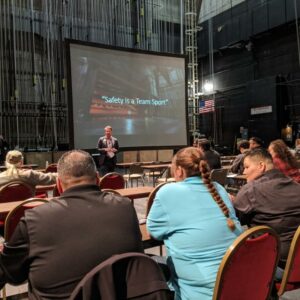San Diego Theatres Hosts Venue Security Training
By Barbara Cosio Moreno
The stage of the San Diego Civic Theatre was transformed into a classroom for important security, safety and crowd management training.
On Thursday, January 16, 2020, Mark Herrera, Director of Education and Life Safety for the International  Association of Venue Managers (IAVM), and Greg Overstreet, Director of Security at Mercedes Benz Stadium in Atlanta, led a “class” of 150 in situational awareness and venue security.
Association of Venue Managers (IAVM), and Greg Overstreet, Director of Security at Mercedes Benz Stadium in Atlanta, led a “class” of 150 in situational awareness and venue security.
Organized by the staff of San Diego Theatres, which manages and operates the Civic and Balboa Theatres, along with partner presenter Broadway San Diego, the day-long training brought together attendees from the San Diego Opera, San Diego Gay Men’s Chorus, Classics 4 Kids, CSC Security, the San Diego Concourse, Horton Plaza Mall, the San Diego Downtown Partnership, Pechanga Sports Arena, SDSU Viejas Arena and IATSE Local 122.
“Preparedness beats paranoia,” said Herrera. “I am proud to see that the San Diego Theatres team, its key stakeholders and partners, are investing the time to collectively and collaboratively strengthen their security posture through community wide training. It’s an honor to deliver this training to an awesome group of dedicated professionals with a passion to make their respective environments safe.”
Herrera has completed over 300 live training programs throughout the United States, Mexico, and Canada for all venue types to include key stakeholders from their respective communities. The course is designed to enhance situational awareness by providing training to enhance mental preparation, response and mitigation to safety issues.
Overstreet led the class to earn their Trained Crowd Manager certification. He was able to supplement the lesson through real-life scenarios and examples he’s experience in his role as a security director.
“Having someone of Mark Herrera’s caliber training us on situation awareness and plans of actions helps our staff serve San Diego better,” said Brendan Farley, Director of Operations for San Diego Theatres. “This training from IAVM provided an opportunity to have our C-level to our front line event staff on the same page. The reality of today’s safety and security is our team – our staff, our clients, and our neighbors – needs to be informed, engaged and involved when and if a situation arises.”
San Diego Theatres is a 501c3 nonprofit arts organization that manages, markets, operates and maintains the San Diego Civic Theatre in the heart of downtown and the historic Balboa Theatre in the Gaslamp Quarter. Our mission is to deliver exceptional performing arts and educational experiences, foster collaboration and partnerships, and create an accessible place for all people to enjoy the arts.
Barbara Cosio Moreno is Director, Marketing & Communications for San Diego Theatres.
In Memoriam: John Graham, ASAE President & CEO
From ASAE Statement
It is with great sadness that the American Society of Association Executives announces the passing of its President and CEO John H. Graham IV, FASAE, CAE, after an extended battle with cancer. On behalf of ASAE’s Board of Directors, staff, members, industry partners and other stakeholders, we extend our deepest sympathies to John’s family.
While no words can adequately express our deep sorrow at losing our leader, the ASAE team is profoundly grateful  for the opportunity to know and work with John. Graham was a transformative leader for ASAE and a mentor to many in the association community. During his tenure, which began August 1, 2003, ASAE more than doubled its membership and developed a wealth of innovative products and services to benefit association professionals and their partners. Graham leaves behind an organization marking its centennial in 2020, and his spirit will forever be the foundation of ASAE’s work moving forward.
for the opportunity to know and work with John. Graham was a transformative leader for ASAE and a mentor to many in the association community. During his tenure, which began August 1, 2003, ASAE more than doubled its membership and developed a wealth of innovative products and services to benefit association professionals and their partners. Graham leaves behind an organization marking its centennial in 2020, and his spirit will forever be the foundation of ASAE’s work moving forward.
In his acceptance of the 2013 Association TRENDS’ “Association Executive of the Year” award, Graham touched on why he found association management such a personally rewarding profession.
“Whatever our personal journeys have been – however we came to embrace associations as our life’s work – we can take great pride in the advancement of this profession,” Graham said. “Our organizations comprise an incredibly innovative, vibrant and diverse sector, and we see innumerable examples every day of how associations effect positive change – not just for the industries or professions they serve, but for society at large. America is quite simply a better place to live and work because the association community is leading the way in areas like professional development and credentialing, standard setting, community assistance, research, and volunteerism.”
Before ASAE, Graham served the American Diabetes Association in Alexandria, VA, for 24 years, the last 13 as chief executive officer. In his tenure as CEO, ADA quadrupled in size, from $50 million to $200 million in annual revenues and successfully moved from 53 independent, separately incorporated affiliate organizations to one nationwide organization with one staff, one budget and one plan. Before joining ADA, Graham served the Boy Scouts of America for nine years. In May 2015, he was recognized by the Boy Scouts of America as a Distinguished Eagle Scout. Graham served on the Association Committee of 100, U.S. Chamber of Commerce; as chairman of the Mobile Giving Foundation Board of Directors; on the Board of Directors of the Lambda Chi Alpha Foundation; and as President of the National Capital Area Council, Boy Scouts of America.
The Graham family will hold a private service for John in Pennsylvania and a memorial service in Washington, DC, will follow.
In lieu of flowers, contributions may be made in his memory to organizations that were particularly important to him, including:
The National Capital Area Council, Boy Scouts of America, Attn: Development Department, 9190 Rockville Pike, Bethesda, MD 20814 or www.ncacbsa.org/grahammemory.
The Cradle of Liberty Council, Boy Scouts of America, 1485 Valley Forge Road, Wayne, PA 19087 or donations.scouting.org/#/council/525/appeal/1676.
VCS Cancer Foundation, P.O. Box 194, Herndon, VA, 20172 or VCSCancerFoundation.org.
Arrangements are by R. L. Williams, Jr. Funeral Home, Inc., 3440 Skippack Pike at Cedars Rd., Skippack, PA. Online condolences may be made to the family at www.RLWilliamsFuneralHome.com.
With John’s passing, the ASAE Board has announced that Susan Robertson, CAE, will continue to serve as interim president and CEO of ASAE.
John Graham, ASAE President & CEO, Dies… John H. Graham IV, FASAE, CAE, has died after an extended battle with cancer. Graham’s tenure as the head of ASAE began on Aug. 1, 2003, and with Graham at the helm the association more than doubled its membership. Graham was previously the CEO of the American Diabetes Association. His family will soon hold a private service in Pennsylvania. A memorial service in Washington, D.C., will be held at a later date, ASAE said.
Amarillo Civic Center Complex Marketing Administrator Earns Citizenship
By Melinda Landry
Amarillo (TX) Civic Center Complex Marketing Administrator Han Owens has fulfilled a dream in earning United States citizenship.
“The process is hard because you have a gazillion paperwork to do,” the newly minted citizen said. “You can’t help but to wonder and worry because your loved ones are here and you don’t want to leave them here.”
Han, who grew up in Taiwan, came to the United States as a high school exchange student in Denton, Texas. She  stayed to attend, and later graduate from West Texas A&M University in Canyon, Texas. After she earned her bachelor’s degree in 2011, she started a job with the ACCC and got married in 2012. Han’s new goal was to become a citizen of the United States. She applied for the Green Card process and said that she never expected that she’d spend the rest of her life in the U.S., receiving citizenship. Han passed her naturalization test in November and completed her Oath of Allegiance at a Naturalization Ceremony on January 7, 2019.
stayed to attend, and later graduate from West Texas A&M University in Canyon, Texas. After she earned her bachelor’s degree in 2011, she started a job with the ACCC and got married in 2012. Han’s new goal was to become a citizen of the United States. She applied for the Green Card process and said that she never expected that she’d spend the rest of her life in the U.S., receiving citizenship. Han passed her naturalization test in November and completed her Oath of Allegiance at a Naturalization Ceremony on January 7, 2019.
Han is married to Texas native Nathan Owens. The couple has a two-year-old daughter named Addelyn Rose and two dogs, Raiden and Samantha.
The Amarillo Civic Center Complex staff is proud to be a part of Han’s legacy.
Melinda Landry is Event Manager for the Amarillo Civic Center Complex.
Orange County Fills Top Job at Nation’s 2nd Largest Convention Center
By Scott Powers
The Orange County Convention Center, operating for nearly two years under interim and acting leadership, will be taken over by the former leader of the Austin Convention Center, Orange County Mayor Jerry Demings announced.
Mark Tester, who was described as someone who literally grew up in the convention industry and eventually rose  to leadership positions in Chicago and Austin, Texas, was announced as the new executive director of the Orange County Convention Center, which is the second-largest in the country behind Chicago’s McCormick Place. He will start February 10.
to leadership positions in Chicago and Austin, Texas, was announced as the new executive director of the Orange County Convention Center, which is the second-largest in the country behind Chicago’s McCormick Place. He will start February 10.
“I believe Mark Tester’s goals of creating high-end customer service and driving economic impact through sales and marketing aligns perfectly with my expectations for what the Orange County Convention Center can be, both now and in the future,” Demings said in a news release.
The center, which has 2 million square feet of exhibition space, has been under interim and acting leadership since late winter 2018 when Kathie Canning left the executive director’s position. For part of that period, former Mayor Teresa Jacobs held open a search for a new leader for Demings, who was elected in August 2018 and took office in December 2018.
The center is growing. Orange County has embarked on a $605 million expansion and improvement that will create a new grand concourse and a multipurpose venue that will bring the total exhibit space to 2.3 million square feet.
Tester’s father operated destination marketing organizations and later, convention and trade shows. After entering the industry himself, Tester spent 13 years working in the Chicago convention community. There he held senior positions at both the Chicago Convention and Tourism Bureau [now Choose Chicago] and the Metropolitan Pier and Exposition Authority, the owner and manager at that time of McCormick Place, the nation’s largest convention facility. In 2008 he became director of the Austin Convention Center.
“I greatly appreciate the support of Mayor Demings and the Orange County Board of County Commissioners, and look forward to working with the strong team at the OCCC,” Tester said in the release. “I have always had great admiration for the phenomenal work of the OCCC and its employees, and look forward to my role in Orlando, the nation’s premier destination for conventions.”
Scott Powers is an Orlando-based political journalist.
Los Angeles Clippers Readying for Move to Proposed New Arena
By R.V. Baugus
Professional sports teams relocating is not new. In the NFL, the Oakland Raiders became the Los Angeles Raiders then the Oakland Raiders and now the Las Vegas Raiders. Somebody got raided. Speaking of Los Angeles, the NFL Los Angeles Rams became the St. Louis Rams only to again become the Los Angeles Rams.
In the NBA, perhaps the most unusual mascot move came when the New Orleans Jazz became the Utah Jazz. The Charlotte Hornets were born and moved to become the New Orleans Hornets. After Charlotte rebirthed a franchise they took with them the Hornet name while New Orleans decided on Pelicans in honor of its being the Pelican State.
Maybe the most awkward feeling in sports is when two professional sports franchises share a venue. It has worked well at MetLife Stadium where the NFL New York Giants and New York Jets both play.
Across the country, both the Los Angeles Lakers and Los Angeles Clippers play at STAPLES Center. Those old  enough to remember recall the Clippers migrating north from San Diego while keeping the appropriately named Clippers which certainly fits with San Diego. Heck, even the Lakers arrived back in the day from being the Minneapolis Lakers.
enough to remember recall the Clippers migrating north from San Diego while keeping the appropriately named Clippers which certainly fits with San Diego. Heck, even the Lakers arrived back in the day from being the Minneapolis Lakers.
The Clippers, though, are ready to have their own venue with the release of the first images of the planned Inglewood arena it hopes to call home in 2024. Inglewood, you will recall, was at one time the Lakers home with the Great Western Forum.
The NBA basketball team’s proposed 18,500-seat arena will have a three-dimensional oval design with an exterior of diamond-shaped metal panels inspired by the concept of a basketball swishing through a net. The panels have been designed to provide solar benefit for maximum energy efficiency, as part of the facility’s LEED GOLD-certified design.
The Inglewood Arena will revitalize mostly vacant land under the flight path of Los Angeles International Airport. The project is targeted for completion by fall of 2024, following the expiration of the Clippers’ lease at STAPLES Center.
In our industry, “on the move” does not refer to just people, but as you can see venues, teams, and franchises as well.
Do you want to receive a Front Row News weekly digest?
Categories
- Allied (856)
- Architecture (147)
- Arenas (744)
- Career (890)
- Convention Centers (889)
- Education (608)
- Events (1,528)
- Food & Beverage (193)
- Foundation (113)
- Guest Experience (1,482)
- Industry News (2,253)
- Leadership (1,872)
- Marketing (150)
- Membership (1,985)
- Music (212)
- Performing Arts Centers (453)
- Professional Development (398)
- Research (127)
- Safety & Security (425)
- Sports (763)
- Stadiums (607)
- Student (159)
- Technology (515)
- Ticketing (92)
- Touring (82)
- Trends (357)
- Uncategorized (768)
- Universities (216)
- Video (25)
- Young Professional (198)
Twitter Feed
- Twitter feed loading
Recent Posts
- Fort Worth Unveils Plans for Phase 2 of Convention Center Transformation
- San Diego Convention Center CEO Announces Retirement After a Decade of Leadership
- City of Fort Worth Names Sanchez Serrano Public Events Director
- Notice of Membership Dues Increase
- Invest in Your Association. Invite the Future.
Categories
- Allied
- Architecture
- Arenas
- Career
- Convention Centers
- Education
- Events
- Food & Beverage
- Foundation
- Guest Experience
- Industry News
- Leadership
- Marketing
- Membership
- Music
- Performing Arts Centers
- Professional Development
- Research
- Safety & Security
- Sports
- Stadiums
- Student
- Technology
- Ticketing
- Touring
- Trends
- Uncategorized
- Universities
- Video
- Young Professional
Archives
- February 2026
- January 2026
- December 2025
- November 2025
- October 2025
- September 2025
- August 2025
- July 2025
- June 2025
- May 2025
- April 2025
- March 2025
- February 2025
- January 2025
- December 2024
- November 2024
- October 2024
- September 2024
- August 2024
- July 2024
- June 2024
- May 2024
- April 2024
- March 2024
- February 2024
- January 2024
- December 2023
- November 2023
- October 2023
- September 2023
- August 2023
- July 2023
- June 2023
- May 2023
- April 2023
- March 2023
- February 2023
- January 2023
- December 2022
- November 2022
- October 2022
- September 2022
- August 2022
- July 2022
- June 2022
- May 2022
- April 2022
- March 2022
- February 2022
- January 2022
- December 2021
- November 2021
- October 2021
- September 2021
- August 2021
- July 2021
- June 2021
- May 2021
- April 2021
- March 2021
- February 2021
- January 2021
- December 2020
- November 2020
- October 2020
- September 2020
- August 2020
- July 2020
- June 2020
- May 2020
- April 2020
- March 2020
- February 2020
- January 2020
- December 2019
- November 2019
- October 2019
- September 2019
- August 2019
- July 2019
- June 2019
- May 2019
- April 2019
- March 2019
- February 2019
- January 2019
- December 2018
- November 2018
- October 2018
- September 2018
- August 2018
- July 2018
- June 2018
- May 2018
- April 2018
- March 2018
- February 2018
- January 2018
- December 2017
- November 2017
- October 2017
- September 2017
- August 2017
- July 2017
- June 2017
- May 2017
- April 2017
- March 2017
- February 2017
- January 2017
- December 2016
- November 2016
- October 2016
- September 2016
- August 2016
- July 2016
- June 2016
- May 2016
- April 2016
- March 2016
- February 2016
- January 2016
- December 2015
- November 2015
- October 2015
- September 2015
- August 2015
- July 2015
- June 2015
- May 2015
- April 2015
- March 2015
- February 2015
- January 2015
- December 2014
- November 2014
- October 2014
- September 2014
- August 2014
- July 2014
- June 2014
- May 2014
- April 2014
- March 2014
- February 2014
- January 2014
- December 2013
- November 2013
- October 2013
- September 2013
- August 2013
- July 2013
- June 2013
- May 2013
- April 2013
- March 2013
- February 2013
- January 2013
- May 2012
- March 2012
- December 2011
- November 2011
- October 2011
Recent Comments
- Frank Bradshaw, Ph.D., CVE on John Meyer, CVE, a Tireless Advocate of Certification for Venue Professionals, Has Died
- Neil Sulkes on Hilary Hartung, Friend to Many in Venue Marketing, Has Left Us
- Jason Parker, CVE on The Devastation of Hurricane Helene and How We Can Support One Another
- Larry Perkins on Touhey Testifies Against Speculative Ticketing Before Congressional Subcommittee
- Peter Secord on Major Players for Planned Elkhart Amphitheater Were in the Mix at VenueConnect
